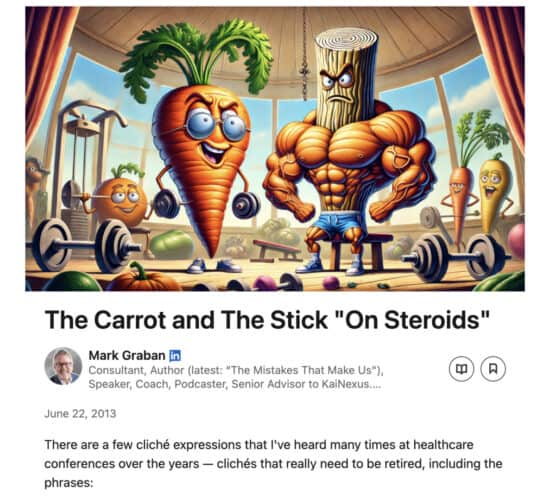I've written a new post that I've published as part of the LinkedIn Influencer series:
The Carrot and The Stick “On Steroids”
Please check it out. I hope it makes you chuckle and think. Feel free to comment there if you're a LinkedIn user or leave a comment below. Click the link above or the image below to read more.
You can also read this on Medium.com or find the full text below.

There are a few cliché expressions that I've heard a lot of recently at healthcare conferences. Some of these clichés really need to be retired, including the phrases “carrot and the stick” and “on steroids.”
The cliché “on steroids” is usually used in a way that's supposed to have a surprisingly positive connotation. One example I heard recently was basically, “Our hospital's emergency department fast track is actually like a fast track on steroids.”
What the speaker means to say is that the “fast track” is bigger, better, and more effective.
What I hear, in my own warped mind, is that “The emergency department looks good, but it is prone to fits of rage, acne, and shrunken testicles.”
Do these speakers not realize that steroids and other performance-enhancing drugs (PEDs) are no longer glorified in sports and that they have really harmful side effects? At least people realize the term “… on crack” is considered a negative expression. The same should be true with “… on steroids.”
We need another pithy expression that means something like, “our fast track is like a fast track that dedicates itself to a goal, eats right, and works incredibly hard.” It's easier to say “…on steroids” but it's clumsy and inappropriate, especially in a healthcare context.
The other phrase I've heard too much of is “the carrot and the stick,” as in “there are only two way to motivate healthcare professionals – the carrot and stick.”
First off, I really disagree with that statement, as most employees (especially in healthcare) have a natural intrinsic motivation to do a good job. In an environment where leaders connect people's work to an important mission and work together to remove systemic barriers to doing good work, people WILL do a good job.
We don't need to bribe people (through rewards) or threaten them with punishment (the “stick”). As Dr. W. Edwards Deming famously said, “Substitute leadership.”
Secondly, talking about the “carrot and the stick” is offensive because the expression was originally used in the context of motivating donkeys. Yes, donkeys. Are your employees donkeys or mules?
As I researched this expression this week, there's an interesting debate about the phrase — is it “carrot and the stick” or is it “carrot or the stick?”
The phrase is often used, as I used it above, to mean a reward OR a threat. Some say the origin of the phrase was really all about POSITIVE motivation. They say the role of the stick is not a threat of physical punishment. The stick is used as part of the carrot incentive (the stick dangles the carrot out in front, creating the incentive, as shown in this cute illustration).
Hitting donkeys with sticks is probably not the way to get them to move, anyway, since we've all heard the expression “stubborn as a mule” (who would like to go do some field research on this?). Do the park rangers at the Grand Canyon give riders a stick to hit their mules with? I doubt it (nor would I expect actual carrots to be involved).
So, back to humans… even if the “carrot and the stick” metaphor is all about positive rewards and incentives, there is a lot of great research to show that positive “if then” rewards work… but create great dysfunction (see Daniel Pink's outstanding book Drive for more on this).
Let's say I'm a conference organizer and I don't want anybody using the phrase “on steroids.” Maybe I should try using the carrot and the stick… the carrot or the stick…. nah. I guess I'd be a leader and explain why I think the “on steroids” expression is inappropriate and I'd hope I could convince speakers to be intrinsically motivated to avoid this phrase. Could this be more effective than offering them $20 for NOT using it (paid after the speech) or threatening to cut their microphone if they do?
Please scroll down (or click) to post a comment. Connect with me on LinkedIn.
Let’s work together to build a culture of continuous improvement and psychological safety. If you're a leader looking to create lasting change—not just projects—I help organizations:
- Engage people at all levels in sustainable improvement
- Shift from fear of mistakes to learning from them
- Apply Lean thinking in practical, people-centered ways
Interested in coaching or a keynote talk? Let’s start a conversation.










“____ on steroids” is on a university’s annual banished words list:
http://www.lssu.edu/banished/current.php